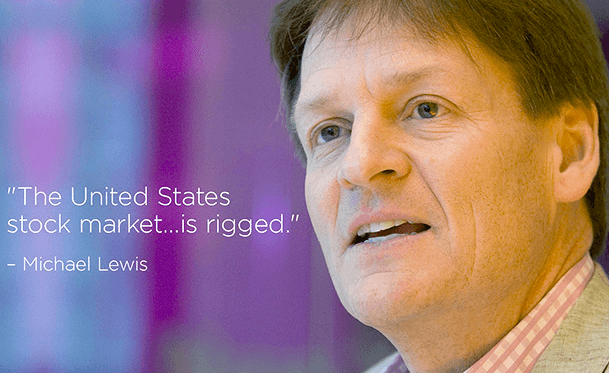Why Should We Care About the Heroes of Wall Street? On Michael Lewis, Flash Boys, and the Villains of Finance

You don’t say?
Michael Lewis has a pronoun problem. The superstar author of books like Moneyball and The Big Short (and former Wall Street trader), Lewis is in the midst of promoting his latest book, Flash Boys: A Wall Street Revolt. It’s the story of how a small group within Wall Street, named high-frequency traders (HFT), has used unimaginably fast computers to trade stocks at speeds at several hundreds of times faster than the blink of an eye, giving them an unfair advantage; one graph in a recent New York Times Magazine excerpt of the book showed 44 trades of General Electric in one-tenth of one second. “The stock market is rigged!” Lewis told 60 Minutes, and Fresh Air, and the countless other outlets on which he’s appeared in the past week.
This is where the problem comes in. Just whom, exactly is the market rigged for and against? Whom do HFTs have an unfair advantage over? In Lewis’ telling, it’s over “you and me and regular investors,” as he said yesterday on Fresh Air. It’s a tale of “predators” and “prey.” A tale of “us” versus “them.” As it turns out, Lewis’ idea of “us” or a “regular investor” might not really include you or me.
The hero of Lewis’ book is Brad Katsuyama, a senior trader with the Royal Bank of Canada (RBC). In order to make Katsuyama and RBC sound relatable, Lewis goes well out of his way to present them as outside the clubby Wall Street atmosphere. “No one wants to work for RBC. RBC is a nobody,” Lewis quotes Katsuyama as saying. The bank is Canadian, for God’s sake! This is actually part of his argument for why they are outsiders. That they are Canadian. This may be, but RBC is by Lewis’ own admission the fifth-largest bank in North America, with operations in 52 countries and assets on the order of $781 billion. They are by all accounts a gigantic financial institution. This doesn’t stop Lewis from referring to his villains as “big banks” and “traders.” Isn’t that who his heroes are, too?
His readers are supposed to understand that Katsuyama is nice and high-frequency-traders are not. Katsuyama just wants to make money for his bosses by trading on the open market! Of course, this is what HFTs want, too. It’s just that they’ve found a way to succeed using technology and lateral thinking. Ironically, this is exactly the kind of thing Lewis celebrated in his book Moneyball. Indeed, one can imagine the reverse of Flash Boys: a plucky young group of nerds descend on Wall Street and figure out a way to beat the old-money crowd at their own game using super-advanced computers.
This is really the truth of the story: one group of stock traders has found a way to beat out another group of stock traders. In his attempts to get the average reader to care, Lewis tries to paint the “regular traders” as being the people working on your retirement fund. As Andrew Ross Sorkin wrote recently in the New York Times, “Where do you think high-frequency trading firms are getting the money to invest? Pension funds.” Lewis’ story is fascinating, as always, featuring a colorful cast solving a mystery worth billions of dollars. It’s just that the heroes and villains are both on the same side.
Today, the stock market is in the midst of its longest-ever sustained period of growth. Yet that has little effect on the average American. Even as recently as 15 years ago, during the first dot com bubble, it was easy to see the effects of Wall Street’s bull run on America (or at least to imagine that you saw them). Today, those gains are concentrated with the super wealthy. You won’t see anyone living better, unless you’re looking in Greenwich or Palm Beach. The financial sector’s good times are decoupled from the rest of the economy, but unfortunately its bad times aren’t. This seems deeply confusing and unfair. In promoting his book, Lewis seems to point a finger at HFTs as the culprit. These are the guys who are making the world unfair. Well, not really. Or, more accurately, they’re making the world unfair for another group of people who make the world unfair, regular everyday Wall Street guys.
Forgive me if I’m unsympathetic. It’s hard to get worked up about millionaires preying on other millionaires. It’s like an exposé on unfair pricing at Bentley dealerships, or a scandal in yacht club fees. It’s a story about a kind of shark that eats other sharks. Sure, it’s interesting! But it doesn’t involve any of us.
Follow Chris Chafin on twitter @gentlemanstimes
You might also like 




















